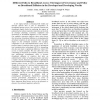Free Online Productivity Tools
i2Speak
i2Symbol
i2OCR
iTex2Img
iWeb2Print
iWeb2Shot
i2Type
iPdf2Split
iPdf2Merge
i2Bopomofo
i2Arabic
i2Style
i2Image
i2PDF
iLatex2Rtf
Sci2ools
HICSS
2011
IEEE
2011
IEEE
Different Paths to Broadband Access: The Impact of Governance and Policy on Broadband Diffusion in the Developed and Developing
A new digital divide is emerging both within and between nations that is due to inequalities in broadband Internet access. Our research examines the broadband digital divide by analyzing the impact of administrative culture and policy initiatives in the form of strategic planning, execution, regulation and investment on broadband diffusion in 139 countries. Our multiple regression analysis shows that factors that determine broadband diffusion in technologically developed countries do not necessarily have the same impact in less developed countries. For example, competition in the telecommunications sector has a positive impact in nations where access to information and communication technologies (ICTs) is expanding, but does not make a significant difference where ICT access is widely available. We also show that when controlling for measures of economic, political, social and educational development, there is greater broadband diffusion in countries that have an administrative cultur...
| Added | 20 Aug 2011 |
| Updated | 20 Aug 2011 |
| Type | Journal |
| Year | 2011 |
| Where | HICSS |
| Authors | David J. Yates, Girish J. Gulati, Joseph W. Weiss |
Comments (0)

